LUCA Ciní – The MAN behind the STORY
Posted on by Wine & Food Society
The Writes´s Credit: Gareth Zebron, Editor in Chief – Real Life Magazine, Phuket Island, Thailand
Particularly for Beyond Taste, Oltre il Gusto Magazine
Photo Copyright: Luca Cinì – A Wine Story, Luca Cinì
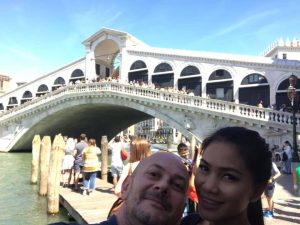 When we think of Italy, we picture Rome with the Colosseum, Florence, Venice and many other tourist attractions. But on a recent trip to Rome, our eyes were opened to the Italian culture. One, yes, deeply intertwined with its ancient roots, but more notably one with food and wine a core part of its essence. So on a hunt to find a piece of Italy in Phuket, we came across a small Osteria at Boat Avenue. As soon as we walked through the front door, we were taken back to our experience in Italy. Recently, we had the opportunity to sit down with Luca Ciní, owner of Luca Ciní – A Wine Story, to find out his story.
When we think of Italy, we picture Rome with the Colosseum, Florence, Venice and many other tourist attractions. But on a recent trip to Rome, our eyes were opened to the Italian culture. One, yes, deeply intertwined with its ancient roots, but more notably one with food and wine a core part of its essence. So on a hunt to find a piece of Italy in Phuket, we came across a small Osteria at Boat Avenue. As soon as we walked through the front door, we were taken back to our experience in Italy. Recently, we had the opportunity to sit down with Luca Ciní, owner of Luca Ciní – A Wine Story, to find out his story.
What is your “Wine Story”?
It’s the story of my life; many stories throughout my life that brought me to where I am now. Everything started when my Grandma used to give me pieces of bread dipped in red wine, telling me not to tell anyone because it was our secret. She wanted me to taste the wine, as her way of telling me that wine is such an important part of our culture. That was her message to me.
Years later, my mum would tell me adventurous stories of my uncle Ugo, an amazing cook, who in the 60s would drive to Bordeaux from the Veneto region in Italy, to attend a wine dinner, and return the next day. It was a great passion for good wine and good food, which is definitely in my DNA as well.
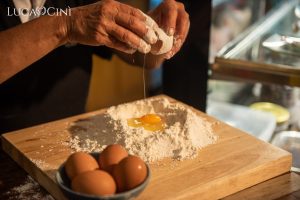 What role has food and wine played in your upbringing and family?
What role has food and wine played in your upbringing and family?
Food and wine is a part of our Italian culture. We used to have dinner or lunch with family, with parents. My mum is still a good cook, so I’ve been spoiled by delicious food. She learnt to cook three different styles, from three different regions of Italy. Veneto, where she’s from, Abruzzo, where my dad is from and Marche, where my parents live and have lived for many years.
For us Italians, the passion for food and wine starts from our family homes. In my hometown, Senigallia and the surrounding areas, the food and wine offering is of high quality – the quality of the ingredients and raw materials. We Italians are quite spoilt for food and wine. You can’t escape from it.
Were you ever in the kitchen cooking with your mother?
I used to be in the kitchen, yes. I was quite curious about my mum cooking, so I would watch her and learn. As a result, later on in my life experience and living abroad, I’ve always been able to cook good food for myself and friends. Thanks to the skills I picked up from my mother, and my grandmothers – learning at home.
What are the most important aspects of Italian food?
I’m not a chef, so I will answer as a food and wine lover. For me, it is the quality of the raw material and the attention to detail. We Italians have 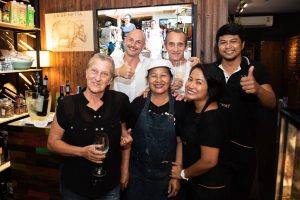 always paid much attention to detail. In the arts, in music, painting, architecture, sculpting as well. I will say also, the most important thing is tradition and authenticity.
always paid much attention to detail. In the arts, in music, painting, architecture, sculpting as well. I will say also, the most important thing is tradition and authenticity.
We’re still cooking dishes we’ve been cooking for thousands of years, so we still have those recipes from all those years ago. Each region, each province, and in each province, every city has its recipes and its style. We have hundreds of recipes that have been inherited since centuries ago. So food and how to cook food is part of our tradition and our history. You can imagine how vast the tradition and history of Italian food is.
Another important thing is that each dish is perfectly paired with a wine from the same area. So it’s a natural, perfect pairing. This is what we are doing here at Luca Ciní – A Wine Story. Making traditional style food from the ancient recipes, using the best raw materials possible, and pairing the right dishes with the right wine.
How would you describe Italian cuisine?
The flavours are given by the product that we use. You don’t have to add many things to add to the flavour of the food. When the products are already good, they already have a great flavour.
In my hometown, for example, we have great seafood. You can cut open raw fish and add a few drops of good olive oil and salt, and it’ll be great. 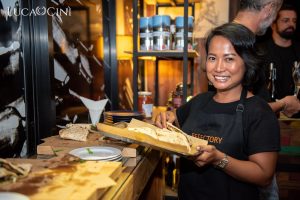 You could do the same with a tomato – add a drop of olive oil and sprinkle a little salt and it’ll taste great. The flavour is in the quality of the ingredients, so the concept is that we don’t want to change the natural flavours of our food.
You could do the same with a tomato – add a drop of olive oil and sprinkle a little salt and it’ll taste great. The flavour is in the quality of the ingredients, so the concept is that we don’t want to change the natural flavours of our food.
What series of events led you to settle in Phuket and launching Luca Ciní?
Everything started 20 years ago, more or less. I was tired of my previous job and started getting more and more connected to what was at that time, and still is my biggest passion – wine. I started going to a very good wine bar after work with a good friend of mine, who is now a chef. It was the first wine bar in my hometown serving high-quality wine by the glass, with appetizers.
My curiosity for wine was growing, so I decided to attend sommelier classes. I attended three levels of Italian Sommelier Association to become a sommelier, and three months of wine marketing at the Gambero Rosso school in Rome. I quit my previous job and started a wine distribution and representative agency with a partner in my area. We were selling very prestigious wines within our territory.
I then opened a wine shop in my hometown. That’s when I received a call from a friend of mine in Hong Kong, whose company was looking for a manager in the wine industry. This was the beginning of 2011 when I decided to move to live and work in Hong Kong. I found the wine market  was oversaturated and it led to a stressful lifestyle.
was oversaturated and it led to a stressful lifestyle.
On a short trip to Koh Samui, I fell in love with Thailand and decided to change lifestyle. I chose Phuket because it was a more connected and internationally oriented destination. After a few months of trying to figure out what to do, it became apparent that the calibre of the wine offering, five years ago, was low. I thought it was an open market for good quality wine. Along with my passion for selling wine, the good amount of interest in high-quality wine and the recently opened Boat Avenue, Phuket made an ideal location to start the shop.
The Osteria concept may be foreign to some. Could you explain it?
Osteria is a very common concept in Italy. It has been around since ancient Rome, where they had shops selling food and selling wine as well. They were set up in strategic locations; selling refreshments and food to travellers. They quickly became a meeting and aggregation points, and often featured music, although easy food and wine were the main focus.
Over time the style has changed, and now my Osteria is a place where you go dressed casually, enjoy good wine and traditional food – food sometimes not on the menu, because chef Bruna will find something special in the market on a day, and create a special dish for that week. This is also the main difference between my Osteria and a restaurant. 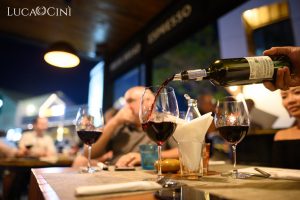 The food on offer isn’t strictly what’s on the menu.
The food on offer isn’t strictly what’s on the menu.
In summary, the concept is quite simple. A relaxed atmosphere, good food, good wine and good music.
For someone interested in understanding the process involved in pairing the right wine with a dish, how does it work?
Well, when a customer selects a dish, I can suggest the right wine to go with it. Many factors are involved. This is something that was part of my training, but also part of my 35 years of experience.
What was your vision for your career when you started in this industry?
I always travel – physically or in my mind. With my previous job, I wasn’t satisfied. When I started working with wine, my desire was always to work abroad. It’s always been one of my dreams – to work abroad with wine and food. Anyone who knows me would tell me that they knew I would have never lived and worked in my hometown forever. Sooner or later I was going to leave and do something somewhere else. The wine was the right tool and the right reason for me to be able to achieve this vision.
What industry similarities and differences have you found between Phuket and Italy?
I could see at the time that the wine market was not mature, and this was 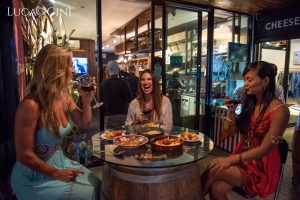 a positive thing. In Italy, I had a wine bar and wine shop, but there are many competitors and the market is saturated. It’s always been different here; like a mission. A mission for me to bring Italian wines, food and culture, which are all tightly connected to Phuket.
a positive thing. In Italy, I had a wine bar and wine shop, but there are many competitors and the market is saturated. It’s always been different here; like a mission. A mission for me to bring Italian wines, food and culture, which are all tightly connected to Phuket.
The market then was ready to receive this challenge, so I think I did it at the right time. I saw a gap in the market so the opportunity was there. Several people, five or so years ago thought my idea to open a wine shop selling only Italian wines was crazy. I remember them telling me that. Maybe I was crazy, maybe I knew what I was doing – but I’m passionate, so it worked. If you have passion, professionalism and knowledge, and do it the right way – with some luck it could work.
Right after I opened, many other wine bars opened, and the wine knowledge grew and more and more Italian wines were imported and more high-quality wines came into the marketplace.
Have you seen growth in the knowledge and interest in wine since you opened?
Definitely. There has been, in the last five years a lot of interest in western cuisine but more specifically higher quality, authentic Italian food and wine. My clientele consists of local expats and a large contingent of local Thais, this is my biggest achievement with the shop, I think.
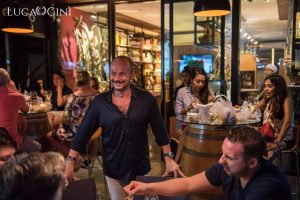 What has been the highlight of your journey here in Phuket?
What has been the highlight of your journey here in Phuket?
There isn’t one highlight. Every year there is one improvement, or event that tells me that I’m doing the right thing here. Things like the growth in the interest of the clients, the renovation of the shop, having a great staff and the addition of new staff.
I’d like to take the opportunity to thank my manager Iddy, who has been with me since day one. She’s a very important part of the shop and has always supported me in achieving what we have here. I’d also like to thank Bruna, my amazing chef (even if she prefers to be called cook). Finally, I’d like to thank Thailand, and Phuket, my home, for allowing me to fulfil my dreams.
What can our readers look forward to in the coming months from Luca Ciní?
We’re always working to keep the atmosphere quite vibrant. We organise exclusive events, private events, events at my osteria, events at villas. We try to have an event every month. We bring food and wine producers from Italy and organise wine tastings with them. We have one coming up in November, but for now, I won’t tell you anything else. You’ll have to 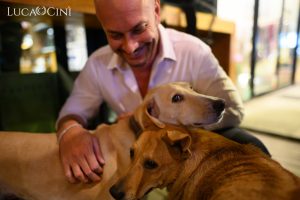 wait and see.
wait and see.
Interview on Valerio BELLINI of Acetaia FERRETTI CORRADINI
Posted on by Wine & Food Society
By: Journalist Margaux A. Cintrano
Photo Copyright: Acetaia Ferretti Corradini
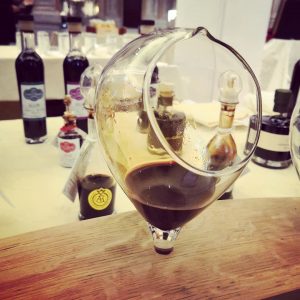 Valerio Bellini´s first contact with Balsamic Vinegar was completely by random. He hails from a family of wine producers and started producing Balsamic vinegar more than a century ago. Valerio´s relocation to Reggio Emilia brought him closer to the world of Balsamic Vinegar and his rediscovering of the grapes that he recalls from his childhood. Feretti Corradini, the artisianal vinegar factory is a union of two families who have been carrying out the long laborious process of creating one of the region´s best Balsamic Vinegars.
Valerio Bellini´s first contact with Balsamic Vinegar was completely by random. He hails from a family of wine producers and started producing Balsamic vinegar more than a century ago. Valerio´s relocation to Reggio Emilia brought him closer to the world of Balsamic Vinegar and his rediscovering of the grapes that he recalls from his childhood. Feretti Corradini, the artisianal vinegar factory is a union of two families who have been carrying out the long laborious process of creating one of the region´s best Balsamic Vinegars.
Margaux: What are your goals for 2020 ?
Valerio: In July 2019, we had started to enlargen the vinegar factory, in the Via Emilia between the cities of Modena and Reggio Emilia. By next spring we will be ready with our larger space and a brand new tasting 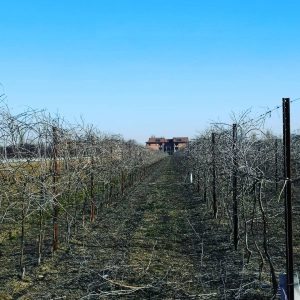 room, created specifically to allow friends, enthusiasts and customers to taste our vinegars with a view of our vineyards! The reception area will become the foundation of our work, and we are already planning to hold events directly in the vinegar factory and in the external spaces. We feel the need to pass on the our tradition and above all the history of a product that the world envies us for.
room, created specifically to allow friends, enthusiasts and customers to taste our vinegars with a view of our vineyards! The reception area will become the foundation of our work, and we are already planning to hold events directly in the vinegar factory and in the external spaces. We feel the need to pass on the our tradition and above all the history of a product that the world envies us for.
Margaux: When we were at Extraordinary Food and Wine 2018, in Venice, you had given me a vinegar tasting. Can you tell our readers, about the different vinegars that you produce, their uses and where you sell them ? Do you have an online shop ?
Valerio: High quality handcrafted products, using only local raw 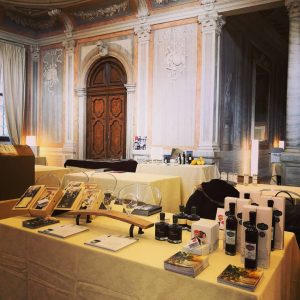 materials without artificially forcing refinement times which can vary from 50 months of the youngest product to over 50 years for Family Reserves. The limited quantities bottled annually are synonymous with absolute craftsmanship, the pursuit of product perfection without getting involved with modernity and fashions. The Reggiana tradition of balsamic vinegar has been recognized since 1040, where at the court of Matilde di Canossa there were the presence of some casks of this precious condiment. We are proud to be producer partners of the CONSORTIUM FOR THE PROTECTION OF TRADITIONAL BALSAMIC VINEGAR FROM REGGIO EMILIA, where we confer our best reserves that will be bottled in the 3 classic labels, ARAGOSTA LABEL (minimum 12 years of aging), SILVER
materials without artificially forcing refinement times which can vary from 50 months of the youngest product to over 50 years for Family Reserves. The limited quantities bottled annually are synonymous with absolute craftsmanship, the pursuit of product perfection without getting involved with modernity and fashions. The Reggiana tradition of balsamic vinegar has been recognized since 1040, where at the court of Matilde di Canossa there were the presence of some casks of this precious condiment. We are proud to be producer partners of the CONSORTIUM FOR THE PROTECTION OF TRADITIONAL BALSAMIC VINEGAR FROM REGGIO EMILIA, where we confer our best reserves that will be bottled in the 3 classic labels, ARAGOSTA LABEL (minimum 12 years of aging), SILVER 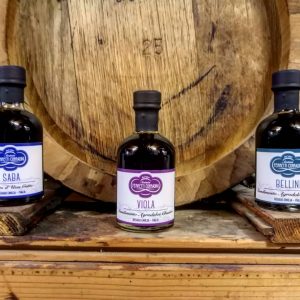 LABEL (about 20 years of aging) and our GOLD LABEL EXTRAVECCHIO (over 25 years of aging) We produce in larger quantities balsamic dressings with aging of 50 months or 72 months for daily use in combination with cooked or raw vegetables, or cheese and meat. The most refined vinegars are used exclusively, a few drops of product can enhance the taste of the dish! We don’t think only of the classic combinations with Parmigiano Reggiano or strawberries, an omelette or a risotto are also a great match, as well as red fruit. I love strawberries and raspberries with our Extravecchio !!! The younger products lend themselves to short cooking, to flavor roasts and braised, great dishes of local cuisine. Just last week I made arrangements with an image and web agency, with whom we started
LABEL (about 20 years of aging) and our GOLD LABEL EXTRAVECCHIO (over 25 years of aging) We produce in larger quantities balsamic dressings with aging of 50 months or 72 months for daily use in combination with cooked or raw vegetables, or cheese and meat. The most refined vinegars are used exclusively, a few drops of product can enhance the taste of the dish! We don’t think only of the classic combinations with Parmigiano Reggiano or strawberries, an omelette or a risotto are also a great match, as well as red fruit. I love strawberries and raspberries with our Extravecchio !!! The younger products lend themselves to short cooking, to flavor roasts and braised, great dishes of local cuisine. Just last week I made arrangements with an image and web agency, with whom we started 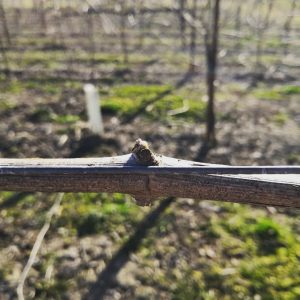 talking about e-commerce. Another goal for 2020, in order to allow customers who visit us to buy their favorite balsamic vinegar at any time!
talking about e-commerce. Another goal for 2020, in order to allow customers who visit us to buy their favorite balsamic vinegar at any time!
Margaux: What interests most people today are the culinary uses of a product. What are some of the uses of your balsamic vinegars ?
Valerio: Our products are designed for daily use, salad and vegetables for our younger balsamic, shellfish and important meat for the most refined. The balsamic lover is a person who would put him anywhere, even outside the usual patterns or historical combinations. And the various balsamic vinegars lend themselves very well to these improvisations!
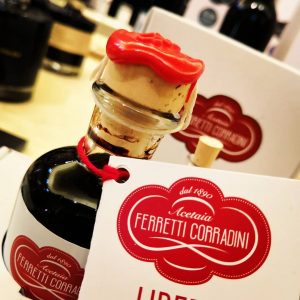 Margaux: Of course, we do not expect you to give away your secrets, however, just very briefly, how is the balsamic vinegar aged and are there any other ingredients added to the process ?
Margaux: Of course, we do not expect you to give away your secrets, however, just very briefly, how is the balsamic vinegar aged and are there any other ingredients added to the process ?
Valerio: Only 3 ingredients: Cooked must of local grapes, the slow passing of the seasons …. the cold winters and the torrid summers, barrels of different wood essences. There are no secrets, the top floor of the vinegar factory (the environment most sensitive to temperature changes) completes the work. Ah, I forgot …..
So much patience, to get a balsamic of good viscosity and ample bouquet you need at least 15 years of aging, 15 years of care on the part of the conductor and 15 passages in barrels of different capacities and 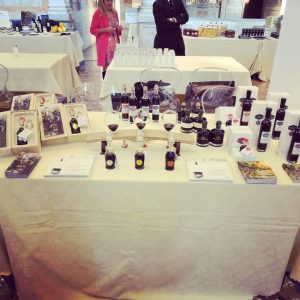 wood essences (oak, cherry, juniper, chestnut) to capture of each of them the particularities and have a complete olfactory and tasting bouquet
wood essences (oak, cherry, juniper, chestnut) to capture of each of them the particularities and have a complete olfactory and tasting bouquet
Margaux: If money were not a problem, tell us about your gastronomic dream trip and why you would select this destination.
I have traveled the world very little, I admit that I still have some difficulties with fear of flying and unfortunately my spare time is also scarce. However, I promised my family that the future will certainly be more “eventful”. I wouldn’t want to be biased or too tied to the territory. However, when it comes to gastronomy I think of our region, Emilia Romagna as a land of traditions and its dishes are famous, all over the world! I’m imagining an ideal tour  in these areas. I have friends who produce fantastic wines and not just Lambrusco, and we both know Flos, Cecilia Lanzani and Denis Beggi, who have a small local saffron cultivation company of the highest quality. And then the first fruits! Emilia is experiencing a Renaissance or comeback, with its variety of products, exceptional raw materials, and special people who know how to create unique excellences in the world! It will be a pleasure to welcome you to our lands, where tradition, friendliness and hospitality are truly a foundation for us!
in these areas. I have friends who produce fantastic wines and not just Lambrusco, and we both know Flos, Cecilia Lanzani and Denis Beggi, who have a small local saffron cultivation company of the highest quality. And then the first fruits! Emilia is experiencing a Renaissance or comeback, with its variety of products, exceptional raw materials, and special people who know how to create unique excellences in the world! It will be a pleasure to welcome you to our lands, where tradition, friendliness and hospitality are truly a foundation for us!
Thank you very much Valerio. A true pleasure.
Publisher Margaux Cintrano of Beyond Taste, Oltre il Gusto Magazine
TASTE your EMOTION with Federico CAPOVILLA
Posted on by Wine & Food Society



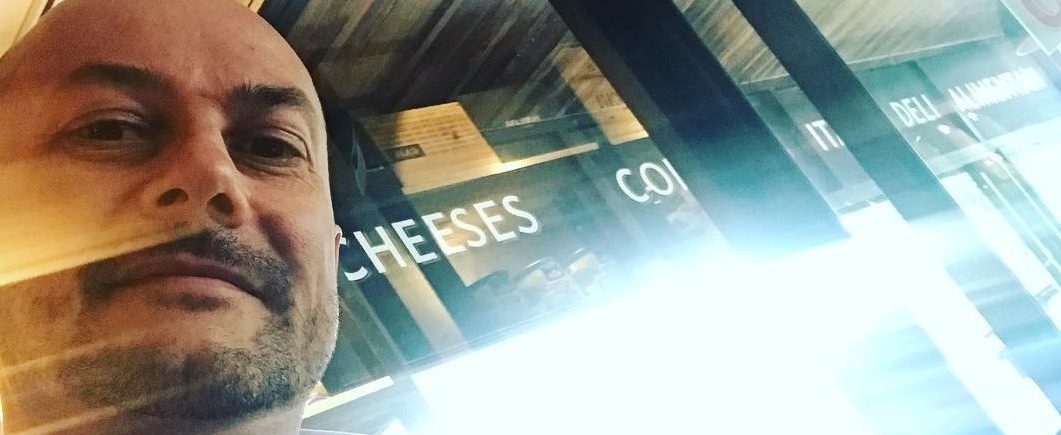
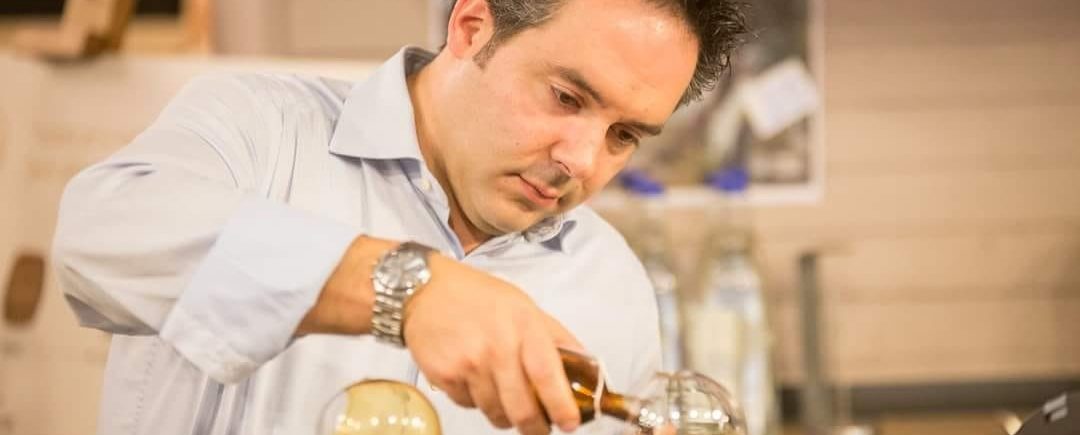
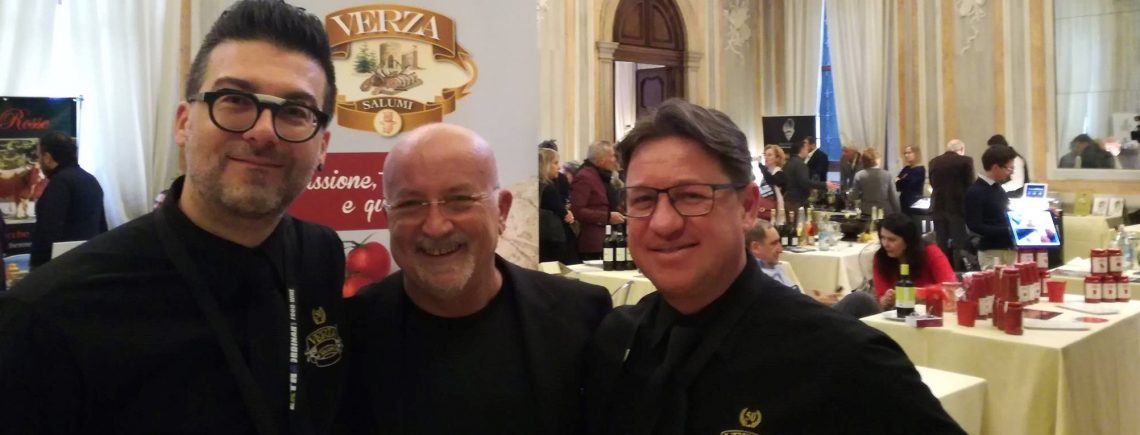
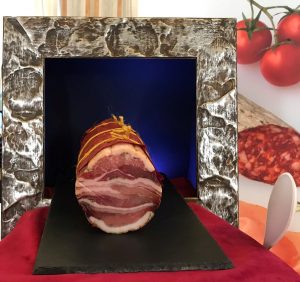
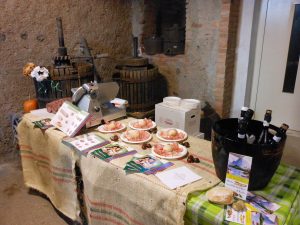
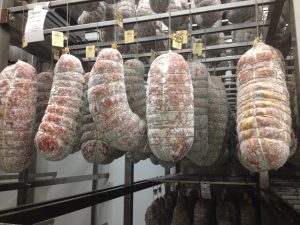
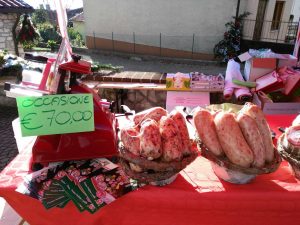
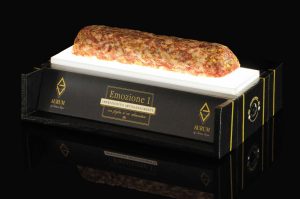
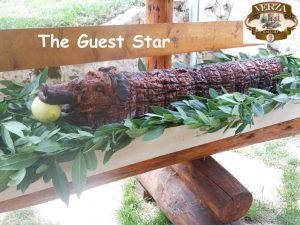
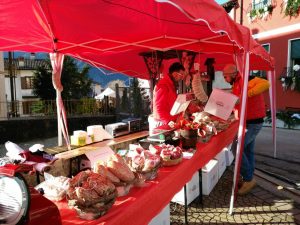
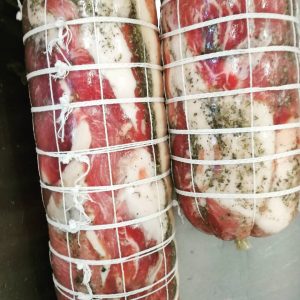
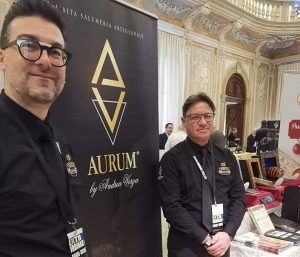
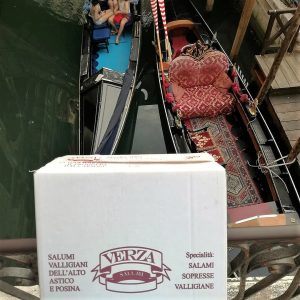

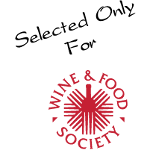

Recent Comments